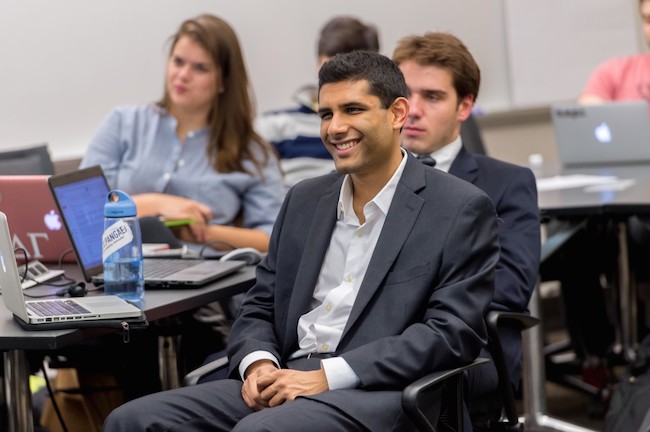HOW TO EVALUATE A COMPANY
Rathi says that, broadly speaking, the Zell Early Stage Fund evaluates most companies on the basis of the actual product or business. There are three main aspects of venture capital, he says.
“The first is that venture capitalists only make money through an exit event — an acquisition or an IPO,” he says. “The second is that as an asset class, venture-backed companies have much higher risk profiles than typical investments, and even the best venture capitalists expect only 10% of their portfolio companies to do very well. Together, this means that venture capitalists look for a very specific type of company — one that is able to exit at a very high multiple in a short amount of time.”
The third main aspect of venture capital: there are “known risks,” Rathi says, and VCs must be comfortable making decisions with incomplete information.
SOME BUMPS ALONG THE WAY
Rathi and his fund classmates took some risks, and things didn’t always pan out.
The group sourced deals in a number of ways — through university connections, through Gordon’s connections, and even through other VC funds that were willing to give them a piece of the deal. But like most VC funds, Gordon says the students did their due diligence and found that most of the potential deals were not investable.
In one particular case, the students found a company they wanted to invest in — but only days before closing the deal, they were squeezed out.
“A strategic investor came in at the last minute and said, ‘We’re interested in this company and we want to get involved, but we want to take the entire round.’ So we, and the other VC funds, were blocked out,” Gordon says. “It was disappointing for the students, because they put a lot of work into it. But I had mixed feelings. It was a great learning experience, because this is what really happens. Welcome to the real world.”
INVESTING IN ADMETSYS
Rathi, whose work at Blueprints for Pangaea meant he already had some experience with medical companies, led the fund’s team on the Admetsys deal. When they were introduced to Admetsys, he says, they investigated the market and determined that the demand existed.
They also found that experts largely agreed that Admetsys’ artificial pancreas would reduce costs and save lives.
“Fortunately, not only was the demand clear, but also Admetsys had a proven track record of efficacy through clinical trials,” Rathi says. “The management team was phenomenal for the task at hand, with backgrounds in endocrinology, hardware, software, and medical technology. There are certainly risks involved with investing in medical device startups, but we were confident in the overall market, the product, and the team, and invested without hesitation.”
LEARNING ABOUT RISK
After this year’s seniors graduate, the incoming senior class will step up to partner and mentor roles in the group, and they’ll train the new juniors on the fund’s portfolio. It’s a portfolio that right now has only one company: Admetsys.
“We’ll keep looking for companies, but with this one, we’ll follow it closely, to see if it hits the milestones we think it will. There will probably be another couple rounds of financing, so we’ll want to be up to date to think about our participation in future rounds,” Gordon says.
For the graduating seniors, he says he hopes they’ve developed analytic skills that are both quantitative and qualitative, and that they’ve learned to look at risk and reward the way investors do.
Ben Rathi says that’s exactly what happened.
“The most important skill the fund taught me was understanding risk,” Rathi says. “In life, returns are usually commensurate with risk. In venture capital, we can find opportunities where the returns significantly outweigh the risk, but require investors to bear a more significant amount of risk than most other investments would entail.”
DON’T MISS TOP FEEDER SCHOOLS TO SILICON VALLEY or BABSON LAUNCHES THREE-YEAR DEGREE OPTION












Questions about this article? Email us or leave a comment below.